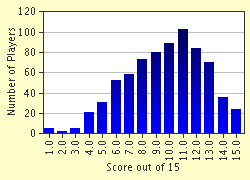Quiz Answer Key and Fun Facts
1. A conceptual investigation of fundamental issues.
2. The questions - 'What makes right actions right? What are the right actions?' - are questions related to what branch of philosophy, which deals with the question of value?
3. What branch of philosophy studies knowledge?
4. Knowledge gained prior to birth and recollected through reason is associated with what type of philosophy?
5. Knowledge gained through our five senses.
6. What is the view that events are predetermined by an impersonal force or power, and cannot be altered by human action?
7. What is the view that the universe operates like a machine according to the law of cause and effect?
8. Suppose that there is a purpose, goal or final cause to the universe and that it all contributes to achieving an outcome. What is the word for the study of these ends or goals?
9. What is the moral theory holding that the value of an action resides in its utility or use for the production of pleasure or happiness?
10. A cannot be A and not A in the same respect and at the same time.
11. The assumption that one God is the infinite, unitary, all-powerful, perfectly good and self-existing.
12. The reality that there is no god in existence, but that the concept of God only exists in the mind and nowhere else.
13. A Platonic Theory that concepts exist in perfect form within the intelligible world.
14. A 19th-20th Century movement that reflects on the existence of human beings in the real world.
15. A moral theory that the highest greatest good is pleasure.
Source: Author
rodricushr
This quiz was reviewed by FunTrivia editor
CellarDoor before going online.
Any errors found in FunTrivia content are routinely corrected through our feedback system.


